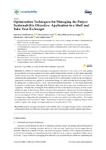Optimisation Techniques for Managing the Project Sustainability Objective: Application to a Shell and Tube Heat Exchanger

Ver/Abrir
Use este enlace para citar
http://hdl.handle.net/2183/25781Colecciones
- Investigación (EPEF) [590]
Metadatos
Mostrar el registro completo del ítemTítulo
Optimisation Techniques for Managing the Project Sustainability Objective: Application to a Shell and Tube Heat ExchangerAutor(es)
Fecha
2020-06Cita bibliográfica
Cartelle Barros, J.J.; Lara Coira, M.; de la Cruz López, M.P.; del Caño Gochi, A.; Soares, I. Optimisation Techniques for Managing the Project Sustainability Objective: Application to a Shell and Tube Heat Exchanger. Sustainability 2020, 12, 4480. https://doi.org/10.3390/su12114480
Resumen
[Abstract]
In addition to traditional project management objectives (cost, time, scope and quality, among others), it is now necessary to include a global sustainability objective in all projects, regardless of their nature and scale. The processes for managing this objective may include sub-processes for optimising the sustainability of some or all of the project’s deliverables. In this paper an integrated optimisation technique was applied to optimise the design of a shell and tube heat exchanger (STHE) by taking into account economic, social and environmental indicators. A case study previously analysed in the literature, although with different objectives and scope, was considered for such a purpose. Diverse sets of weights were defined for the environmental impacts, as well as two additional cases. In the first one, all the indicators where assessed in a linear way. Non-linearities were studied in the second one. Both non-nature-inspired (exhaustive search and Monte Carlo simulation) and nature-inspired (Particle Swarm Optimisation, Crow Search Algorithm and Non-dominated Sorting Genetic Algorithm-II) optimisation techniques were used to solve the problem. The results were presented and discussed in depth. The findings show the necessity of applying these kinds of methodologies in the design of energy systems and, in particular, STHEs
Palabras clave
Gestión de proyectos
Desarrollo sostenible
Intercambiadores de calor
Sostenibilidad del medio ambiente
Desarrollo sostenible
Intercambiadores de calor
Sostenibilidad del medio ambiente
Versión del editor
Derechos
Atribución 4.0 Internacional
ISSN
2071-1050






